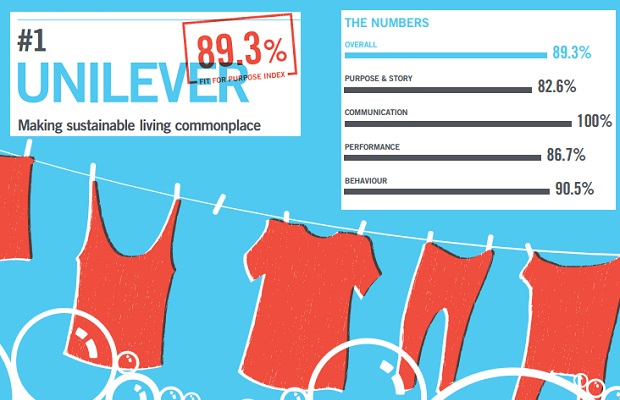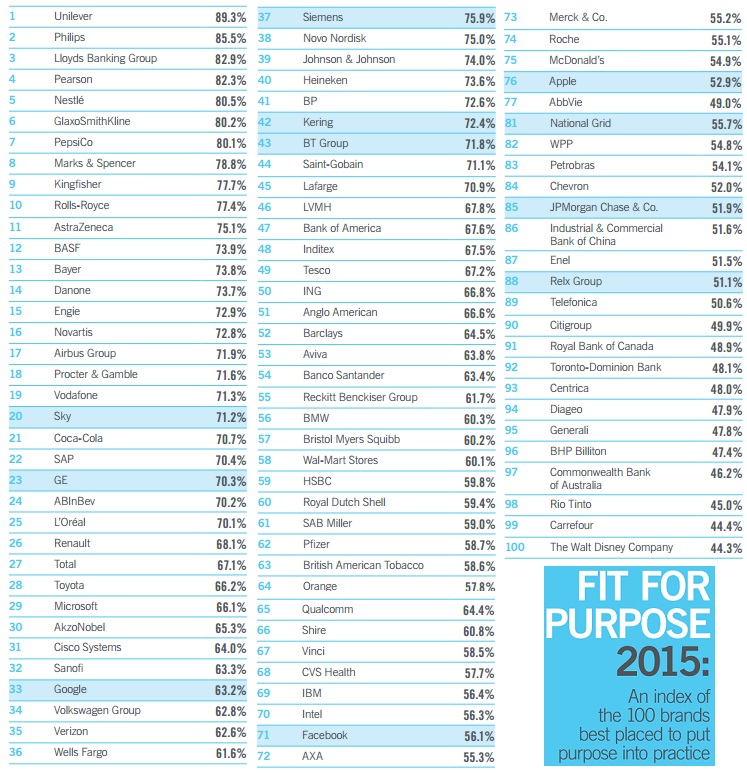Unilever has topped a study looking into brands that achieve their philanthropic goals, ahead of with Philips and Lloyds .

The study by creative agency, Radley Yeldar, indicates that Unilever’s ‘Bight Future’ sustainability strategy made the biggest impact of all the companies listed in the FT 500 and the FTSE Eurofirst 100, having achieved the goals set out in its ‘making sustainable life commonplace’ mission statement.
The Fit for Purpose Index 2015 assessed and ranked companies based on how they live up to the altruistic promises set out in their brand purpose.
The success of Unilever’s Bright Future project was the main driver behind its number one ranking.
The ongoing initiative is a partnership with the WWF and promotes sustainable manufacturing of its products and a pledge of zero deforestation in doing so.
Radley Yeldar assessed the quality of purpose statements, and the extent to which they were embedded into external communications, behaviour and performance.
This involved looking at the brand’s websites, reports, corporate campaigns and social media accounts.
Commenting on the achievement, Paul Polman, Unilever’s chief executive, said: “we can no longer pretend that business can immunise itself from the rising tide of environmental challenges. We see this as the best long term way for us to grow and bring benefits to all our stakeholders. To succeed in this goal, we need to change the way we do business and to scale up the impact on the issues that matter most”.
Philips ranked second in the study with its aims to improve three billion lives a year by 2025 and created seven new Healthcare green products in 2014 designed to improve patient outcomes and expand access to care; green product sales reached 52% of total sales and 55% of the company’s energy usage came from renewable sources.
Lloyds banking group got third spot on the index with their “Helping Britain Prosper” brand promise which aims to enhance Britain’s economic and social wellbeing. For example, one of their metrics is the ‘increased amount of new funding support provided to UK manufacturing businesses per year’. They have achieved their 2014 target for this, setting a 2015 target of £1 billion alongside a 2017 target of £4 billion.
Consulting director at Radley Yeldar, Ben Richards, said businesses were “on the right track” by trying to positively impact on aspects of society” however the report “identifies how hard it is for these companies to translate their intentions into reality and prove their commitment”.
He added that “a purpose statement might once have been manufactured in a corner of an organisation and used on the cover of the corporate brochure: this is no longer good enough. For purpose to be effective it must be an authentic part of every interaction and businesses are well placed to be a genuine force for change, something we’ve seen consumers respond to and support.”
View the full top 100 table below:

The full Fit for Purpose Index 2015 can be viewed here.
